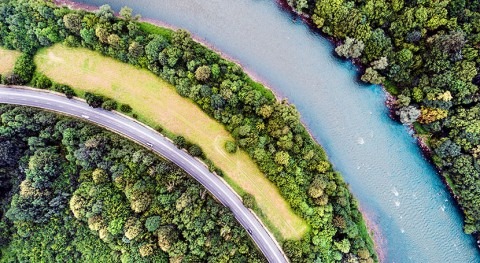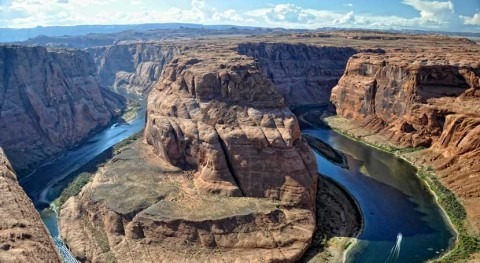William Sarni is an international water strategy and innovation veteran, founder and CEO of Water Foundry, who has dedicated his entire career to supporting private and public-sector companies implement corporate-wide water strategies.
Currently working on a book titled: ‘Digital Water: New Technologies for a More Resilient, Secure and Equitable Water Future,’ he has also served as key author of Xylem and IWA’s recently released comprehensive white paper: ‘Digital Water: Industry Leaders Chart the Transformation Journey’. We speak to him about the potential of digital water and its future trends.
Question: You work with water technology companies as a strategy advisor and investor. What tips would you give a water tech start-up?
Answer: My tips are based upon my advisory role and investments in water technology companies:
- Technology doesn’t sell itself;
- Ensure you understand your customer(s);
- Evaluate how your technology can be scaled across more than one industry vertical (multiple use cases);
- Focus on the quality of your team and business model(s); and
- Build an ecosystem of partners.
Q: You are currently working on a book titled ‘Digital Water: New Technologies for a More Resilient, Secure and Equitable Water Future.’ What potential does digital water have?
Water technology innovation is essential but not without innovation in partnerships, financing and business models
A: I believe digital technologies are, and will continue to, transform the water sector and how other stakeholders relate to water. Digital technologies are transforming other sectors such as transportation, education, healthcare and energy; water will not be an exception. The recent report, Digital Water: Industry Leaders Chart the Transformation Journey highlights how far the water and wastewater utility sector has been transformed by digital technology solutions. Also, digital technologies will be essential in supporting the transformation of the water and wastewater utility sector as it explores how to scale “non-centralized” technologies such as air moisture capture and localized treatment systems.
The water utility sector is not alone in adopting digital technology solutions. For example, digital technologies are transforming the agricultural and industrial sectors. In particular, digital technologies are being deployed in the agriculture sector to improve water efficiency and nutrient management.
Q: Do you think the water sector can learn from other energy utilities that have already embraced digitalization? If yes, how so?
A: Absolutely! The energy sector has moved from centralized systems to a mix of centralized, distributed and off grid systems. This hybrid mix of energy solutions would not have been possible without digital connectivity. The adoption of micro-grids, residential renewables and smart homes is enabled by digital connectivity. The water sector is seeing the same transformation through real time water quantity monitoring and leak detection (e.g., Conservation Labs), the emergence of real time water quality monitoring at the tap (e.g., spout), localized treatment systems (e.g., Organica) and air moisture capture systems (e.g., Zero Mass Water).
Q: Where is the opportunity for digital water technologies especially promising? And why?
We can no longer manage these resources with analog solutions
A: I think of water as a value chain from source (surface water, ground water, rain and air moisture) to infrastructure (water and wastewater systems) to the customer/consumer (e.g., industries, smart homes and cities). Digital technologies are providing vastly improved connectivity from source to use. Equally important is to consider the increasing demands for energy, water and food and the connectivity of these resource needs. The nexus stress created by demands for these resources will need to be mitigated and will rely heavily on digital solutions such as real time monitoring and reporting coupled with predictive analytics. We can no longer manage these resources with analog solutions. If we do, we will not be able to provide these resources to an increasing global population facing the challenges of climate change.
Q: How important would you say water technology innovation is?
A: Water technology innovation is essential but not without innovation in partnerships, financing and business models. Cross industry sector partnerships along with competitors working in a pre-competitive framework and public private partnerships are part of the solutions to solving 21st century water challenges. We also need innovative financing (e.g., blended finance) and business models (water as a service) to scale innovative technology solutions.
Q: What sectors adopt digital water technologies more rapidly. And why?
A: In priority order, right now it looks like; agriculture, industrial, home and water utility sectors. Digital technologies are scaling in the agricultural sector to improve water efficiency and productivity out of necessity. We are placing significant demands on the agricultural sector that is being battered by prolonged water scarcity and flooding (in the US). Creating a more productive and resilient agricultural sector (large scale and smallholder farmers) is essential to provide the food we need globally. Also, industrial sector (e.g., food, beverage and manufacturing sectors) is adopting digital technologies such as AI to reduce operating costs and improve productivity. Of course, we are also seeing the adoption of digital water technologies for homes (e.g., smart taps, watering, etc.). While the water and waste water utility sectors was ranked last I am encouraged by the research results of the Digital Water: Industry Leaders Chart the Transformation Journey.
One of my favorite quotes is from the science fiction author, William Gibson, “The future is here. It’s just not widely distributed yet.” I believe this captures how technology is scaled – not linear but lumpy. Digital water technologies are no exception.
The digital technology wave is gaining speed and traction so I suspect that we will be further along by the end of 2019 than we can predict
Q: These digital solutions, however, can be vulnerable to malice. What is your opinion on cybersecurity for water utilities?
A: I don’t believe any sector should adopt digital technologies without ensuring the security of data, personnel and hard assets. Cyber security is critical for water utilities but also industrial, home and other applications. Any digital technology strategy and roadmap must include a robust cybersecurity plan.
Q: Will the new business models lead to the uberization of the water industry?
A: Great question and I believe we are seeing this happen. For me, it is the democratization of water supply, data and actionable information. For example, it is now possible to generate safe drinking water through residential and scaled air moisture capture systems freeing consumers from centralized water utility systems. There are not always opportunities for this alternative water supply system, but it is now an option in many parts of the world. Also, real time testing of water quality at the tap is within reach and as a result a consumer can know, with confidence, if the water they are drinking is safe and what to do to about it.
Put actionable information through digital technologies, in the hands of customers, consumers and industries and watch how traditional businesses are disrupted and transformed. Ride sharing applications disrupting the taxi industry and, in turn, changing public policies, is the example to watch.
Q: Do you think there is a need for a regulatory body to control the use of this data?
A: I do believe we need regulations to govern how data are used and to protect all stakeholders from abuses. However, I do believe transparency is essential to drive rational public policy on water supply, demand and strategies. We can’t develop and implement a sustainable and resilient water future without clarity and transparency on how we use water. For example, how does a city or country “run out of water?” In my opinion, it runs out because of failed public policy and poorly informed stakeholders.
Q: What trends in digital water do you expect for the rest of 2019?
A: Increased adoption of digital technologies such as data acquisition through remote sensing (e.g., drones and satellite systems), AI applications and real time water quantity and quality technologies for agriculture, industrial, agriculture and residential use cases. Digital water programs are showing up in various industry sectors, industry associations and academic institutions. The digital technology wave is gaining speed and traction so I suspect that we will be further along by the end of 2019 than we can predict.







